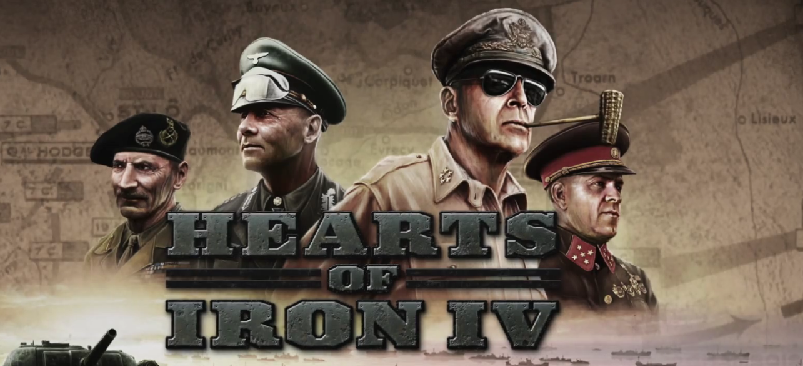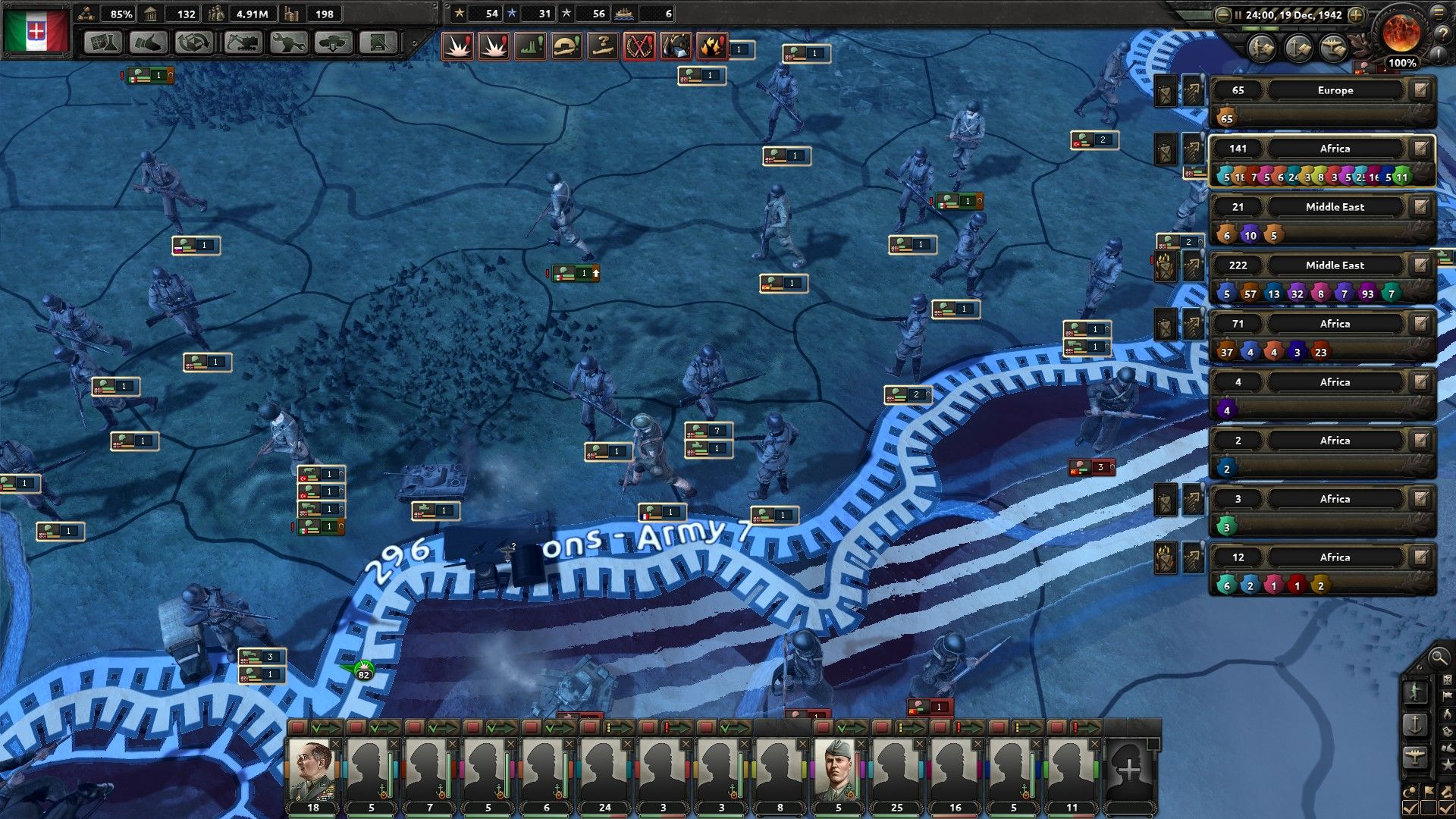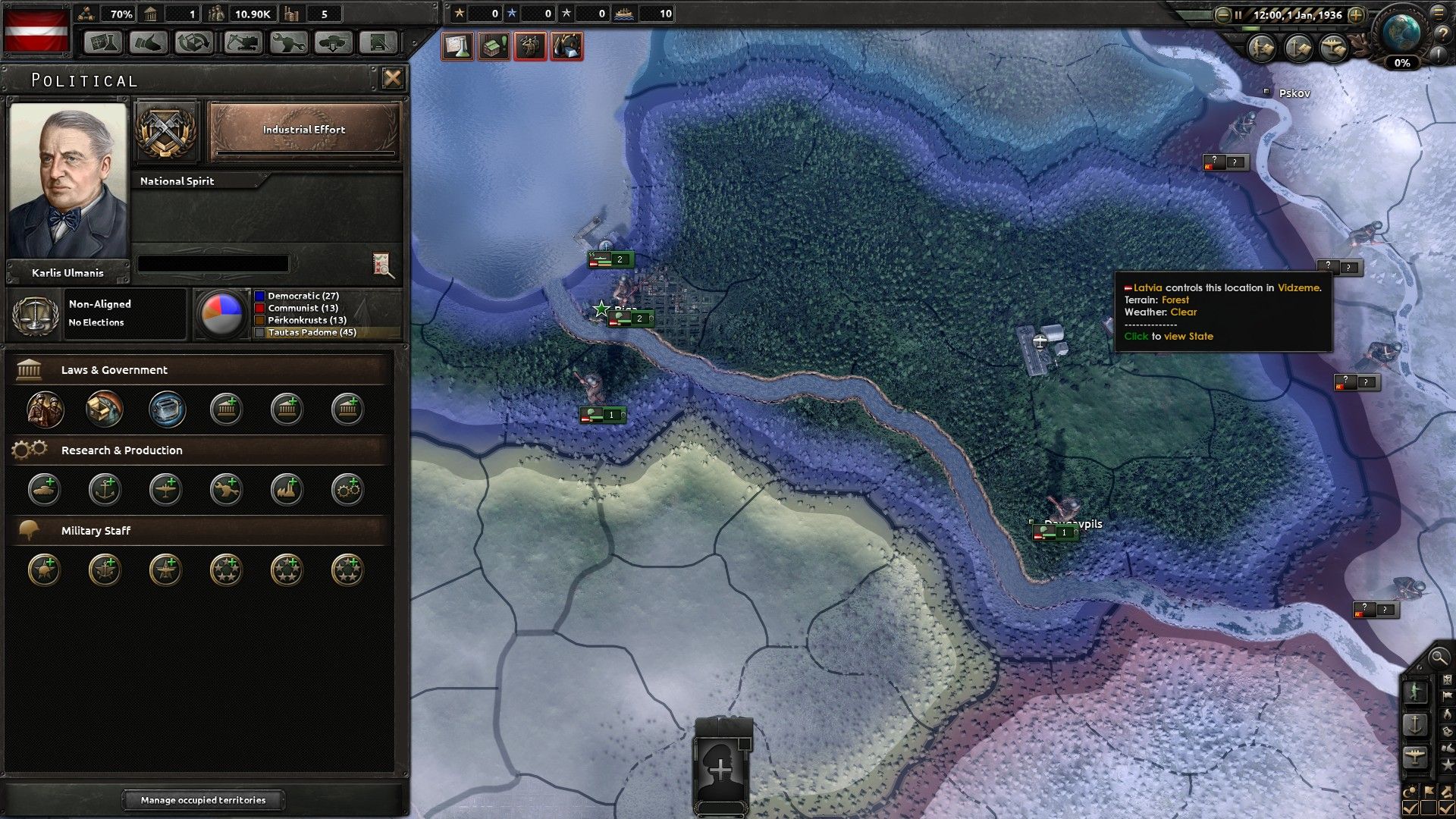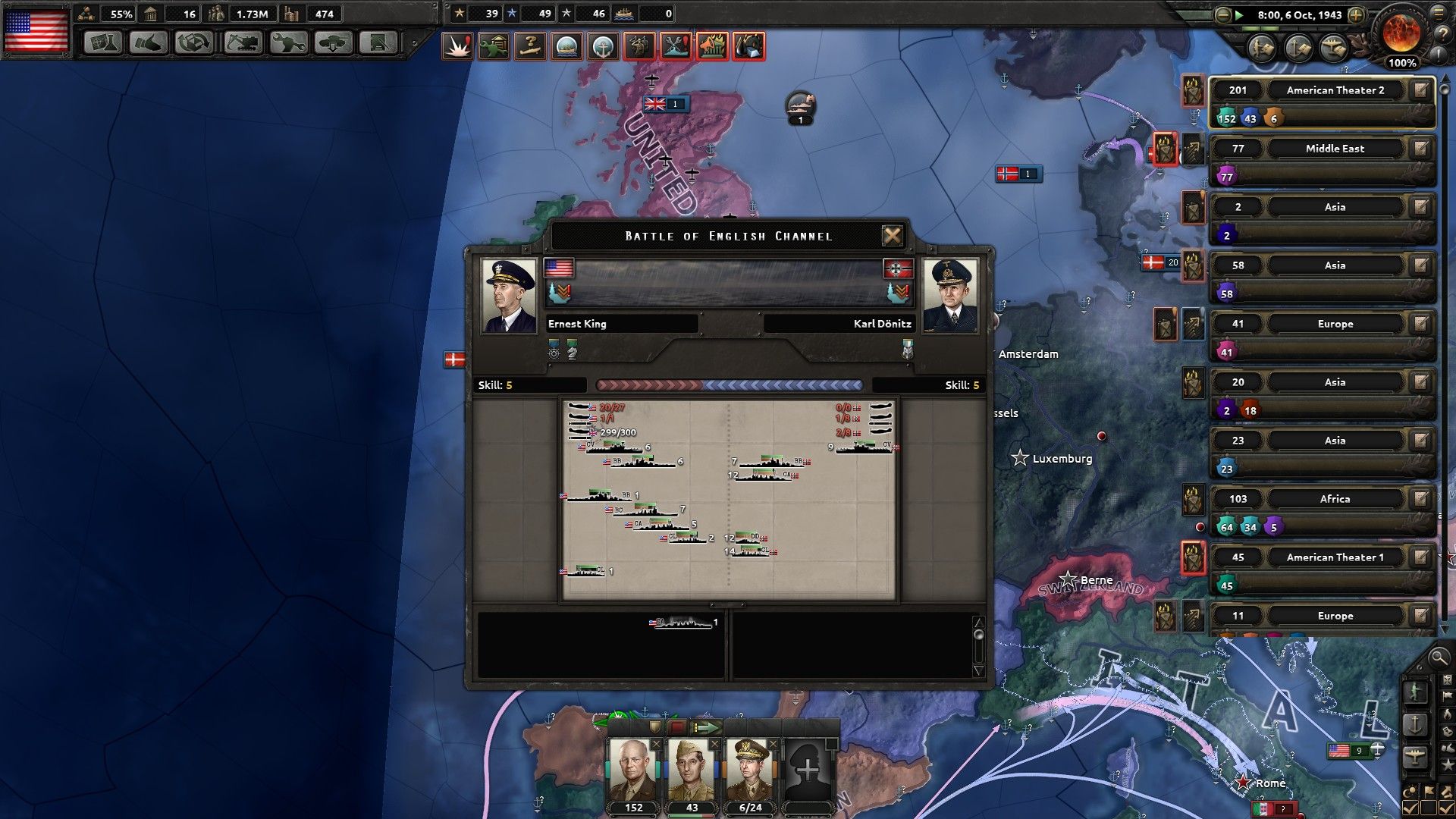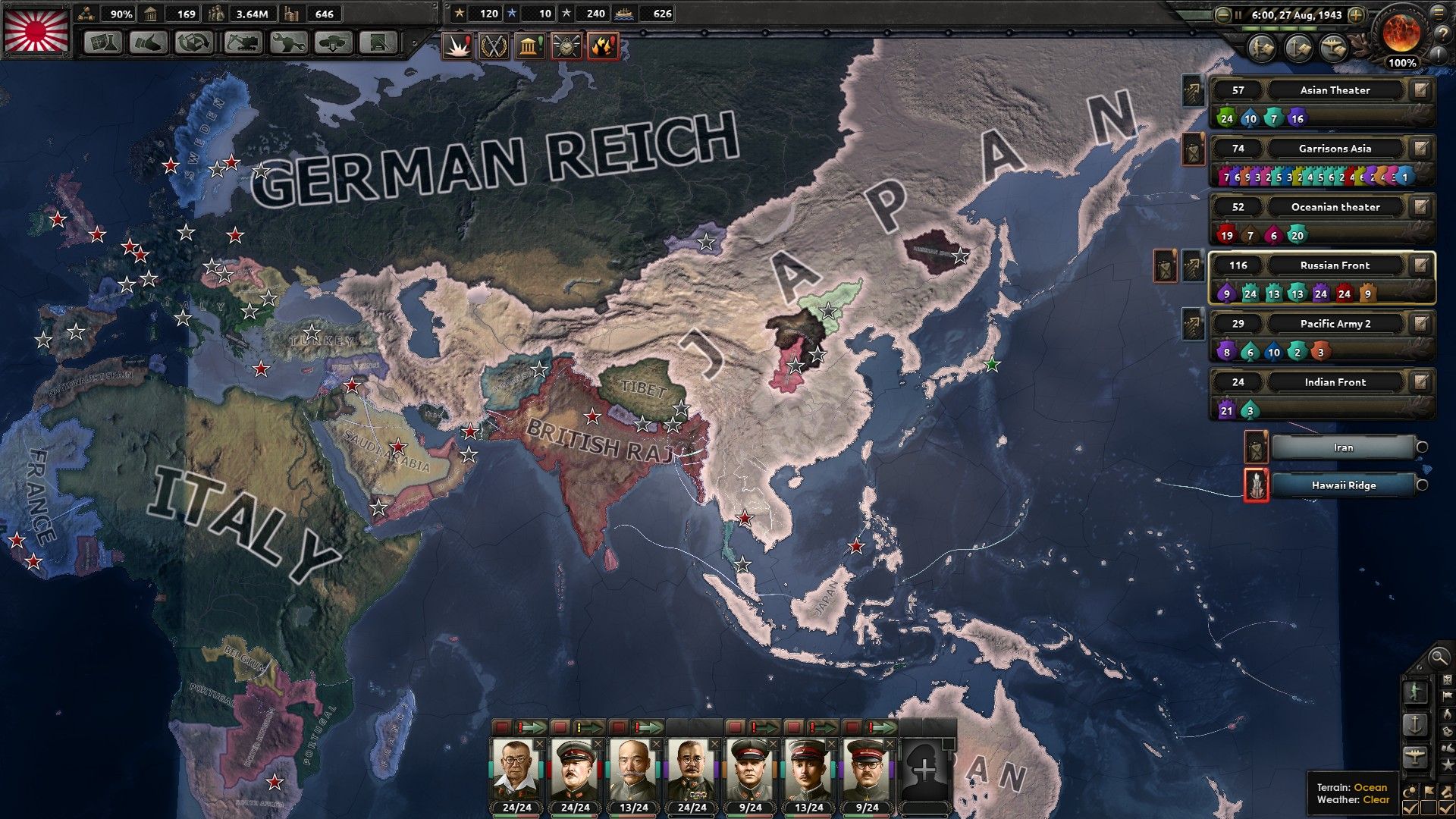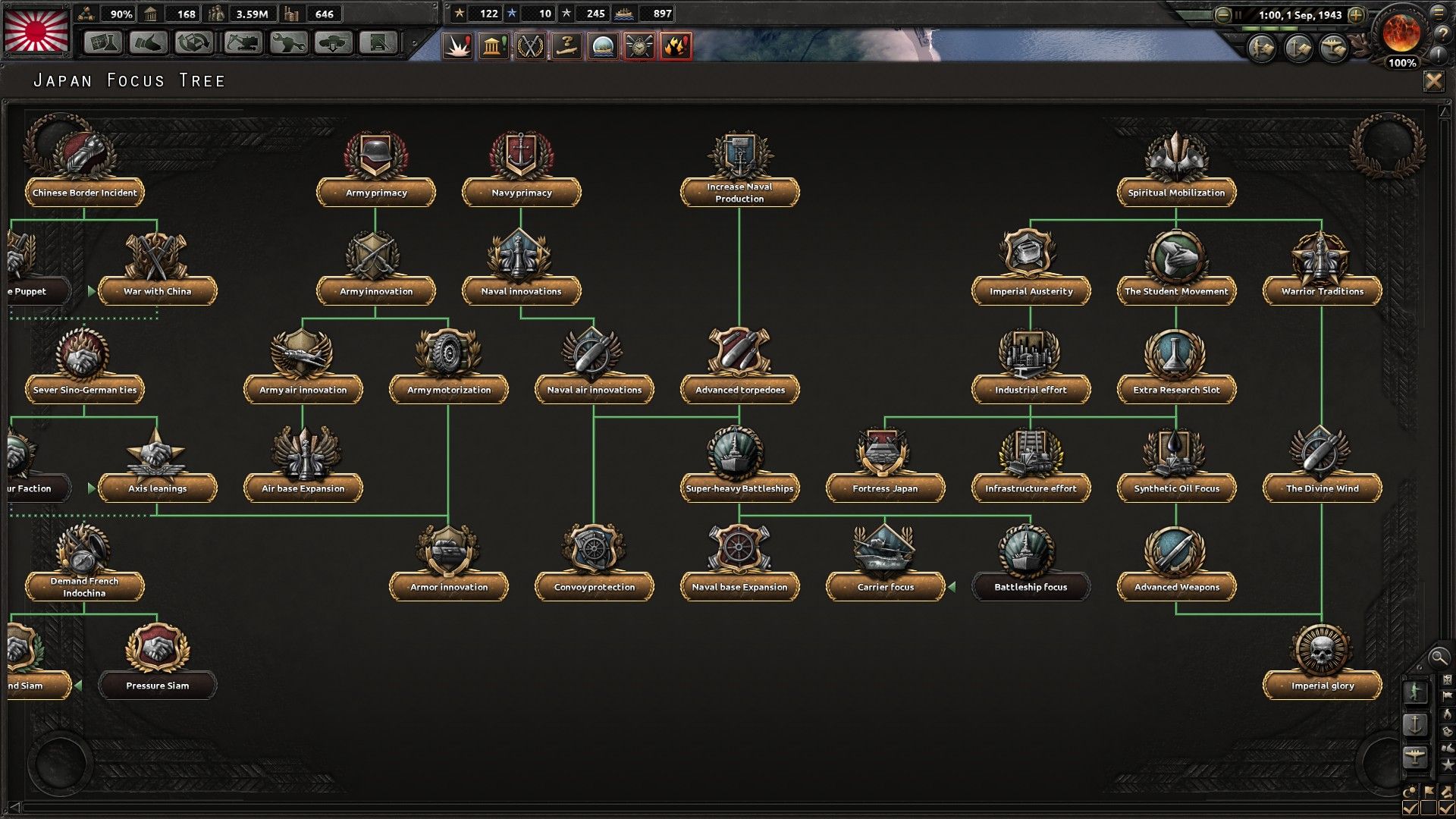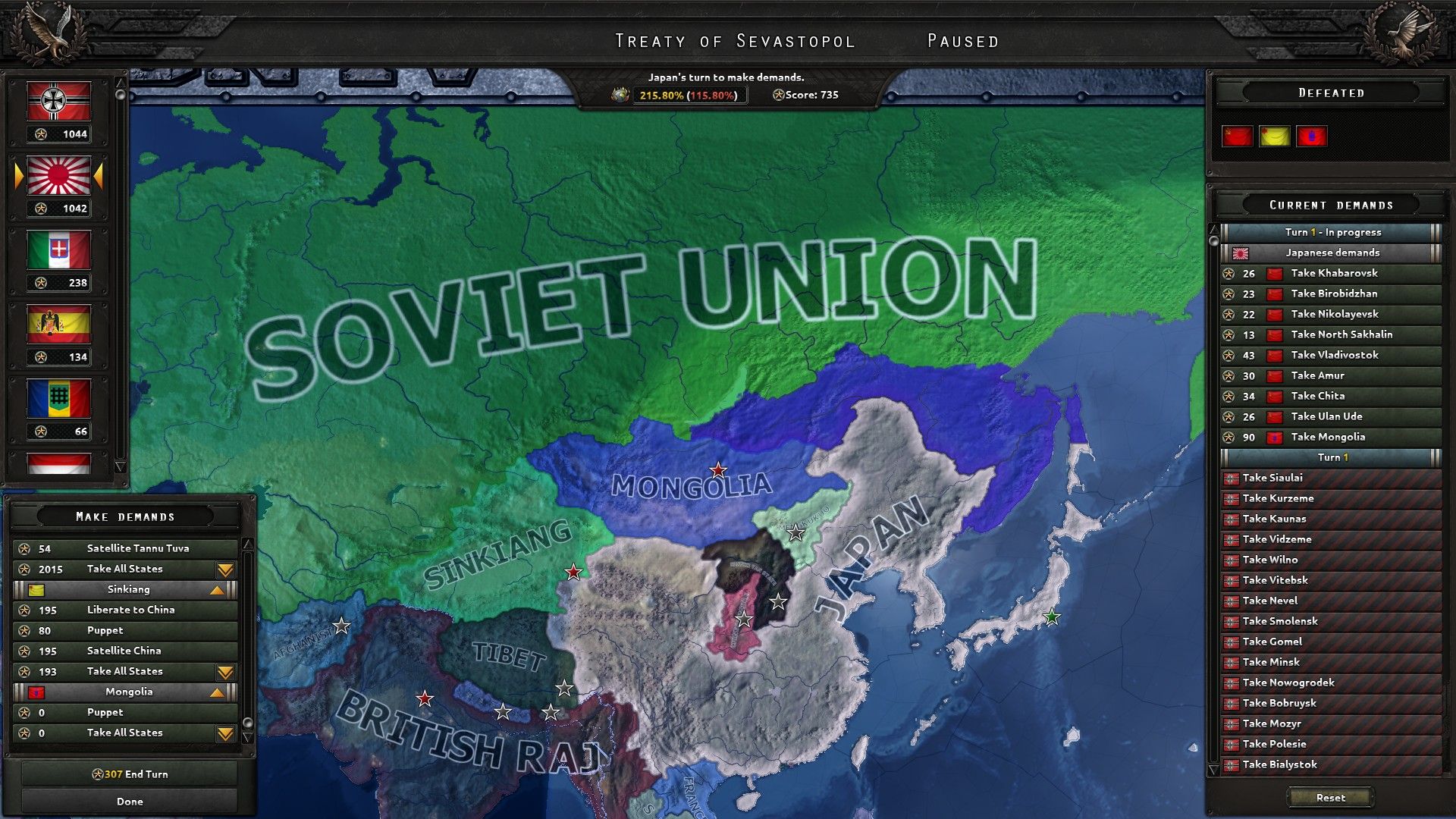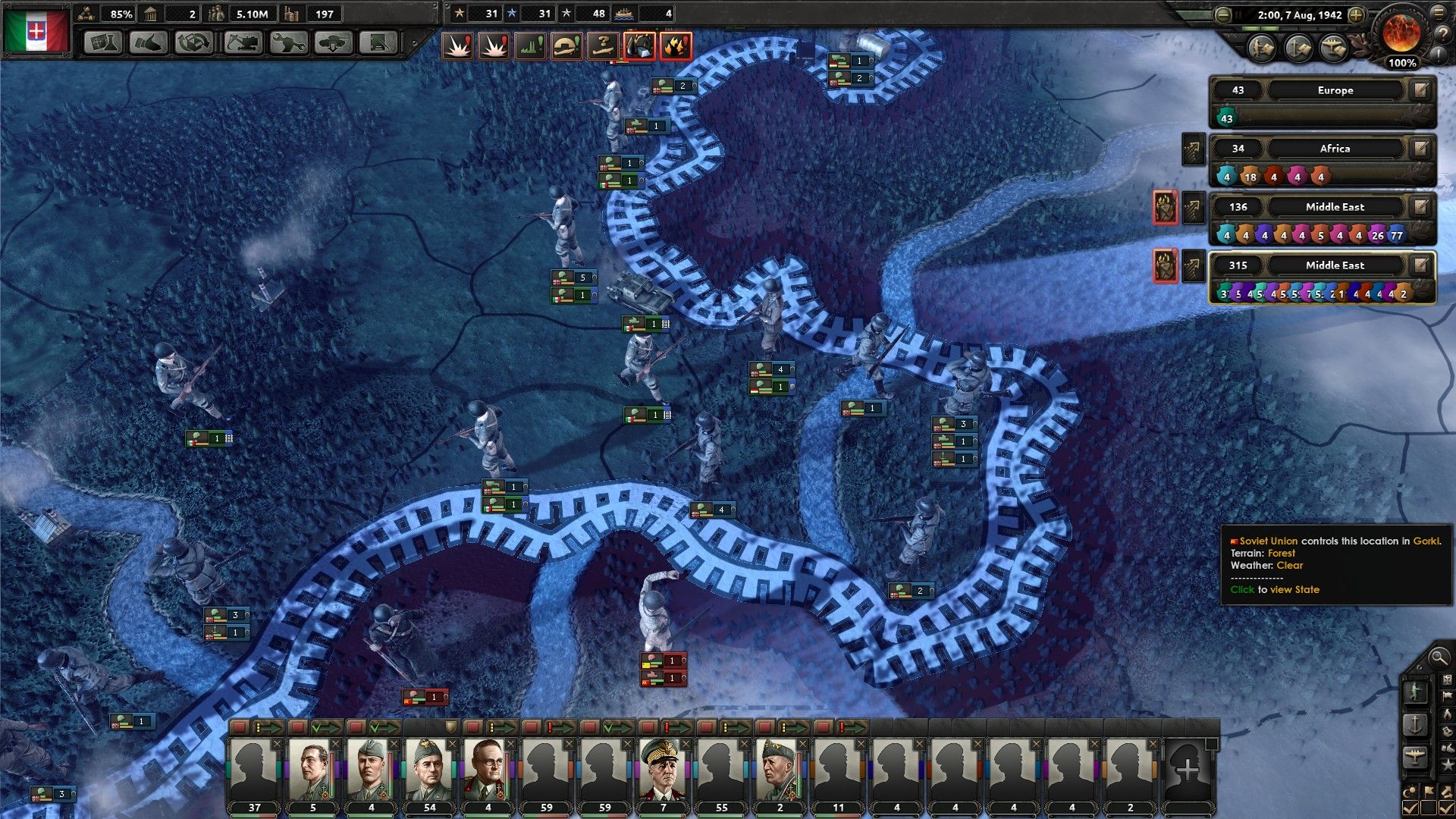Grand Strategy games can be intimidating, and Hearts if Iron IV is no exception to this nearly iron-clad rule. As a matter of fact, it's a game that intentionally throws right in your face so many issues to tackle, that you'll either have the (gaming) time of your life, or you'll tear your hair out before running screaming towards the sunset.
I probably don't need to tell you much about what the game is all about: you'll play one of the nations involved in World War II, and you have to fight your way through the worst part of the 20th century in order to achieve your objectives, whatever those objectives might be.
The initial options are pretty simple, but bring forth deep consequences. You can choose to start your campaign in 1936 or in 1939. Starting in 1936 can change the face of World War II extensively, as you can definitely do a much better job than the real politicians and generals of the time to prepare for the conflict. Of course the fact that you know that war is coming definitely helps.
The early start also gives you plenty of time to change the stance of your nation quite radically, escaping the realm of history and entering that of fiction. What if the United States went full fascist and imperialist, instead of defending democracy through the latter half of World War II after isolating themselves beyond the ocean in the early years? This is just one of the many open-ended scenarios you can explore.
Starting in 1939 puts you on the brink of war, with a lot less time to tamper with history, and ensuring that the conflict will at least start close to its historical nature.
While going full historical can be tempting, I personally can't find a reason to start a campaign in 1939, simply because the early start is so much more fun, and leaves you guessing a lot more on what is going to happen as the calendar advances inexorably towards war.
A second option allows you to select whether the nations governed by the artificial intelligence will try their best to follow a historical route, or will simply run amok following whatever goal they might come up with in that particular campaign.
It's worth mentioning that the former choice does not ensure a fully historical route, as the AI will still have to react to the actions of the player, and many events might still go differently from what history dictates. Yet, the general scenario will be approximately similar to what happened in World War II.
Leaving the AI completely unleashed from the historical yoke is definitely interesting. Remember the example of a fascist and imperialist America trying to conquer the world that I mentioned above? Now multiply that for every nation on the map, and you have an idea of what might happen.
While the focus trees (about which I'll talk later) prevent things from going completely crazy, the alternate history scenarios that can present themselves are still definitely fascinating.
My personal preference is to start in 1936, giving me plenty of time to affect the history of my nation quite radically, but restricting the AI to its historical focus. It's a little less chaotic, but it still gives plenty of freedom to tamper with world-changing events. That said, your mileage may vary, and I can't say that I can't relate with those who prefer the unpredictability of the unleashed AI.
On top of it all, you can also select among three difficulty options, and opt in or out of the "Ironman mode," which locks you on a single save updated automatically every time you take a relevant decision, basically preventing you from correcting your mistakes. Incidentally, if you want to earn the game's achievements, this is the mode you'll have to play on.
After you have chosen those initial options, things really start to get interesting: remember when I said that you'll play one of the nations involved in World War II? I lied. You can play basically every nation that existed at that time, including minor stains on the map that didn't fire a shot.
Of course you can make them fire plenty of shots, and if you're really, really good, your small stain on the map could even become a powerful country capable to at least influence the course of history. Do keep in mind, though, that by selecting a very small nation, you're setting yourself up for a major challenge, especially if you're planning conquest.
Now you're probably asking yourself: why the hell did this dude made me read over 700 word of review, and the game hasn't even started? The answer is simple: the ability to set your starting conditions with great freedom, and to customize with a few clicks how far your campaign will stray from the events of one of the most relevant conflicts of the history of humanity is probably the most charming selling points of the game.
It's literally a few clicks, but if I had to buy the game, Paradox would have sold me on the whole experience just by mentioning them.
Of course, this is all relatively simple, but it's when the game starts that its whole complexity really hits you. Even if you begin in 1936, when most country are still at peace besides a few minor conflicts, you'll immediately find yourself with a load of problems to solve.
The most relevant choices are made in your focus tree, where you'll decide the broad strokes with which you'll paint your nation. Here you can choose technological and political orientations, give a general direction to your military expansion, and even select which factions to join.
Once you have set your general bearings with your initial focus, you'll have to scramble your scientists to research the most appropriate technologies for your situation, splitting your scientific power between new weapons, strategy-defining military doctrines and civilian development that will radically influence your general production capabilities.
The delicate balance between civilian and military productions also reflects on what kind of factories you'll build. By focusing on military factories or dockyards, you'll be able to build more guns, tanks and ships on the short run, but increasing your civilian output will let you build military plants faster, increasing your war-related production radically on the long term.
Sounds complex? We have just started. Once you have your military factories, you need to decide what kind of armaments they'll build, but you can't be hasty. Planning ahead is necessary because reconverting plants to completely different kinds of production will drastically reduce their efficiency. The game definitely rewards heads of state that can see clearly into the future, devise a solid plan and stick to it. Course corrections are costly.
Another important choice, that tends to have enormous ramifications in how your campaign will play, is how you spend your political power, which is a consistently trickling "currency" that allows you to... do political things: you can hire members of your cabinet and military advisers that come with invaluable bonuses, change your conscription laws, trade and economy regulations, and even influence other nations to lean towards your political ideology, or stage a coup to give them the final push.
Of course this is just the tip of the iceberg, as you can influence many, many aspects of your nation's politics, military and demographics even before you get to fire a single shot.
Actually getting involved in a war is a different experience depending on the kind of nation you have at your fingertips. Conflicts and aggression increase the "World Tension" value, which basically indicates how close the world is to all-out-war.
As a democratic power, you'll need a certain amount of world tension to justify your intervention. Your government and people value peace and prosperity, and they won't approve of war until things start to get really hairy.
On the other hand, governing a totalitarian nation will grant you more freedom in waging war, but your aggressive actions will give democratic powers cause to intervene and try to stop your expansion. You'll have to decide whether to tread lightly limiting your conquest, but keeping the big boys out of your hair as long as possible, or to go all out, amassing as much power as you can before the world tension is high enough to turn the everyone with a bayonet against you.
There actually is a fairly interesting aspect to Hearts of Iron IV: it tends to be a game of preparation more than one of execution. Even when you finally get into a major conflict and start moving tanks around, you will assign your units a series of battle plans (that visually reproduce the maps that you often see on history books in a really charming way), and then let them munch on it until they are ready, or until you decide that you can wait no longer.
The longer you let them prepare, the more effective there will be when you finally give them the "go" signal, and it's extremely satisfying to see your units break through the enemy lines in a well devised blitzkrieg, or to observe hostile armored corps trounced by your carefully prepared and entrenched defensive line.
Incidentally, you might be tricked by the game's looks into thinking that this is a turn-based strategy game, but you'd be wrong: Hearts of Iron IV actually plays in real-time, but you have a pause option that lets you take your time and give orders effectively. You can also set the simulation speed manually, allowing you to control quite precisely how hectic or relaxed you want your experience to be.
Of course large scale planning won't always take in account local opportunities and issues, so you'll often find yourself moving your units manually, adjusting their course to take advantage of a chance to encircle their targets or to strike a weak salient, or diverting troops in order to plug gaps in your line.
Incidentally, the AI often tends to be a bit weak in the execution of your plans, even with the recently introduced "aggressive" setting. This means that you'll have to prod your divisions, in order to make sure that they're actually do your bidding instead of twiddling their thumbs after hitting an obstacle.
While this could be considered a weakness of the AI (and it probably is), it works quite well within the grand scheme of things, turning what could appear a rather clinical and aseptic operation, into a dynamic struggle, where even the best plan will often require plenty of adjustments once it impacts against operational reality.
Speaking of divisions, did I mention that you actually get to design their composition unit by unit? This grants an enormous level of freedom and complexity in how you can structure your offensive and defensive forces, balancing organizational integrity, size (which is more important than what you'd think, and not always an advantage), mobility, pure stopping power and much more.
Playing with Panzer divisions and mechanized units is just the beginning. Ground warfare can rarely be successful without the proper air support, and what Pierre Clostermann defined "The Big Show" is simulated in great detail in the game.
You'll have to balance your air force among several classes of planes (fighters, heavy fighters, close air support, tactical bombers and strategic bombers), and then divide them in squadrons, decide where to assign them and how they will operate.
Stealing air superiority from the clutches of your enemies will be an enormous boon to your success on the ground, as your bombers and attacks aircrafts wreak havoc on their troops and ships, and your strategic bombers tear their industry and infrastructure to pieces.
I did mention ships, didn't I? Of course naval operations are just as important, as you struggle to dominate the sea. Not only you'll often need to carefully prepare effective naval invasions, but convoys will be crucial to the survival of your industry, while an effective submarine force can send hundreds of enemy trade ships to the bottom of the ocean, crippling their imports and exports.
And then there is the pride and joy of your navy: a vast array of warship ranging from screen vessels like destroyers and light cruisers, to the queens of the ocean, carriers and superbattleships. creating the perfect fleet by juggling the many classes of ships, while also coordinating with your naval air arm, is very complex and extremely rewarding. You could almost consider it a form of art, where numbers and size aren't always the key to victory.
When you put together war on the ground, in the air and among the sea, Hearts of Iron IV becomes a complex but thrilling war simulation that will really push your organizational and planning capabilities to their limits. If this is what gets your gears spinning, you'll have the time of your life.
Of course, the game doesn't come without flaws. As I mentioned in passing above, the AI isn't always up to par with the enormous complexity of the simulation. Often it appears to put too many eggs in one basket, while in other cases it'll leave entire fronts basically undefended.
I had campaigns as Japan in which I didn't even attack Pearl Harbor (hindsight is 20/20, after all), but I could still waltz all over the Pacific and land nearly undisturbed on the American coasts. Japan itself seems to be dreadfully incompetent (at least in my experience) when left to its own devices as an AI nation, more often than not failing to properly expand in Asia as it historically did, and leaving the rest of the Axis to face even more trouble.
This is probably to be expected, considering that the complexity of the scenario is enormous, and I have seen the campaign AI of much simpler strategy franchises fail just as badly, if not more.
Perhaps the worst flaw of the game is the fact that it doesn't explain its mechanics well enough. If you're not already familiar with the series, you'll probably have to rely heavily on the wiki or on this invaluable Reddit thread to understand what is really going on under the hood of your tanks. If you rely exclusively on the in-game tooltips and tutorial, the ins and outs of supply, organizational integrity and army composition will probably feel more like Voodoo magic than coherent mechanics.
Learning the hard way and finding your precious naval invasion annihilated by a much inferior force, just because their supply lines were too weak, might be a fun experience in itself, but Paradox could have definitely done a better job in communicating the game's inner workings within the UI, and not on external resources.
You'll probably notice that I didn't say anything about graphics, simply because they're really not the point of this game. They're adequate, and the details of the units and of the map are pretty to look at (even if the clipping as ships sail inside each other is pretty atrocious), but to be perfectly honest you'll spend most of your time zoomed out, looking at the map and at a whole lot of menus.
On the other hand, the orchestral soundtrack is definitely lovely, with a variety of tunes that convey the atmosphere of the war quite perfectly. Unfortunately sound effects result quite repetitive, and a few will end up feeling like chalk on the blackboard, with the supply shortage one being a major culprit.
One thing is for sure: like most grand strategy games, Hearts of Iron IV definitely isn't for everyone. If complexity intimidates you, if you want groundbreaking graphics, or if watching at menus and spreadsheets for hours on end is not your thing, you should definitely ignore the score at the top of this review and play something else.
On the other hand, if you want a massive, extremely fulfilling and rewarding simulation of World War II, then this game is a giant cornucopia of conflicts, engaging politics, management gameplay and pure fun. And when you're tired of World War II, you'll have endless alternate history scenarios to explore.
Just make sure to go to work or school in the morning, because if Hearts of Iron IV really clicks with you, it won't let go easily.
Hearts of Iron 4
- Platform(s)
- PC
- Released
- June 6, 2016
- Developer(s)
- Paradox Development Studio
- Publisher(s)
- Paradox Interactive
- Genre(s)
- Strategy
- ESRB
- Everyone 10+

